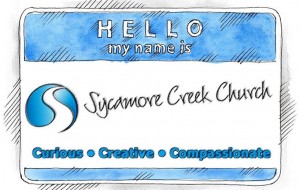
Hello: My Name Is Sycamore Creek Church – Creative
January 11/12, 2015
Tom Arthur
Peace friends!
How creative are you? How creative are those around you? How creative is your family? How creative is the company you work for? How creative is your neighborhood? Your town? Today we’re continuing this series called Hello: My Name is Sycamore Creek Church. Throughout this series we’re looking at three core values that define Sycamore Creek Church. We’ve had a lot of change lately with the move to a new Sunday morning venue, but these three core values remain the same. Sycamore Creek Church is Curious, Creative, and Compassionate. Today I want to look at what it means that we are creative.
Here’s a problem I want to wrestle with today: Living things tend to die. This is true of plants, animals, and humans. But it’s also true of any group of people. All thriving communities, movements, organizations tend toward becoming dead institutions, and dead traditions with dead histories irrelevant to those who are still alive.
The story is told of a new pastor who shows up to lead worship for the first time. This church has a tradition of reciting the Apostles’ Creed each week in worship: “I believe in God the Father Almighty…” As they got to that part of worship, everyone turned around and faced the back of the room. The pastor was caught off guard at this but in the midst of all the new things, he neglected to ask about it. The next week when they got to the Apostles’ Creed the next week, everyone did the same thing. They all turned around and faced the back of the room. After worship, the pastor asked the choir director why they all turned around and faced the back when reciting the Apostles’ Creed. “Oh, that,” she said. “There used to be a cross we would all face but when the sanctuary was painted five years ago, it was taken down and never put back up. But we keep turning around to face the cross.”
As one well known church historian said: “Tradition is the living faith of the dead, traditionalism is the dead faith of the living” (Jaroslav Pelikan, Yale Professor of Church History). I’m afraid too many churches are practicing the dead faith of the living. Mission becomes survival; paying the bills. Outreach becomes inreach; neglectful narcissism. Buildings become tombs; saving memories enshrined in mortar. Or as the founding pastor of Sycamore Creek Church liked to say, we don’t want to be a church with “tight shoes and hard pews.” People begin to ask as a friend of mine on Facebook recently asked, “How do I make the church relevant to my life?” I find in his question a kind of humility because he assumes it is his work to make the church relevant rather than the church’s work to make the church relevant.
Creative
Against this tendency for thriving communities to become dead institutions, Sycamore Creek Church seeks to be curious, creative, and compassionate, and in particular, we want to be creative. We don’t want to get stuck in old ruts. We want to imagine, experiment, and get things done.
Why are we driven to create? I think we are driven to be creative because we are made in the “image” of God, our creator. We read in the beginning of the Bible:
So God created human beings in his own image.
In the image of God he created them;
male and female he created them.
~Genesis 1:27 NLT
The word “image” is the same word that is translated elsewhere as “idol.” Genesis tells the story of God creating his own temple. What’s the last thing you put in a temple? The idol of the God. Humans are the living and breathing idols of God in the temple of creation. We are the image of God. (Maybe that’s why we are so quick to turn one another into idols and worship celebrities and fame more than God.) God creates. We are God’s image. We create.
There’s one big difference. God created from nothing (scholars say God created “ex nihlo”). But all our creations are derivatives. All our creations are mash-ups of previous things created. We are always “playing jazz” on something that came before us. The problem comes, the death comes, when we stop playing jazz, when we stop mashing up, when we stop creating the old into something new.
SCC’s Creative Style – Ministry & Mission
There are three ways that SCC seeks to be creative. We want to be creative in our ministry and mission, our outreach, and our building. Let’s begin with the first one: ministry and mission.
There are 150 psalms in the Bible. The psalms are the prayer book of the Bible. 150 psalms seems like enough for most situations in life, right? Wrong. We read:
I will sing a new song to you, O God!
~Psalm 144:9 NLT
A new song is needed. New situations need new ministries. Old ones don’t always work. I’m not saying throw out the old. I’m saying that if we don’t allow ourselves the freedom to sing new songs when it comes to how we live out our ministry and mission, our living faith of the dead (the old songs) will become the dead faith of the living.
This does mean that things will regularly change around here. We experiment with something new. If it’s an experiment, then that means it might not work. Or if we experiment it means it might work for a time but no longer work at another time. Churches often accumulate ministries like the tax code. We all know the tax code could be smaller and simpler, but instead of cutting codes out, we just keep adding taxes in.
On a very practical level this means that if you’re involved in a ministry, and maybe even your heart is in it and you’ve dedicated a lot of time to it, it may not last forever. In fact, there are really only two things we do at SCC: worship and small groups. We fit everything into those two categories. We try to run a lean mean ship around here. We experiment and are creative within that framework.
Sycamore Creek Church seeks to be the kind of church where we don’t accumulate old dead weight, but we remain creative, ready to meet the needs of present and future generations.
SCC’s Creative Style – Outreach
Paul was the first Jewish missionary to the Gentiles (the non-Jews), and he wrote many letters that became books of the Bible. In his first letter to the church at Corinth he said:
I have become all things to all people, that I might by all means save some.
~1 Corinthians 9:22 NRSV
Paul is regularly attempting to change his approach depending on his context. He’s attempting to reach out to new people groups in new ways. When he’s with Jews, he pays attention to the kosher laws. When he’s with non-Jews, he doesn’t worry about things that might offend his fellow Jews. When he was with the Greeks, he used their poetry and philosophy to make his point and build bridges. He was unwilling to sin, but otherwise, he was willing to do whatever it took to creatively reach out to new people.
Our church has been attempting to do the same thing for some time now. It was originally founded to be a church that was for those who didn’t have a church or didn’t like church. We tried new things to reach new people. Then two years ago we did something new, we started holding worship services in a diner on Monday nights. It seemed like a bit of a crazy idea at the time, but over two years into it, and we see that we’re reaching all kinds of new people by adapting what we do to where our culture is currently at. People are busy on Sundays. They work, sleep in, play sports, or travel. A lot of churches just complain that our culture doesn’t save Sundays any more for worship. We figured that complaining wasn’t going to help anyone follow Jesus, so we decided to adapt. Jonathan Doll and his wife Laura Harlow among many others found out about us because of our Church in a Diner. Jonathan was taking his Toyota to get fixed across the street from Grumpy’s, and stopped into the diner for lunch. He saw the table tent on the page and was curious about this church doing Church in a Diner. The rest of the story is downhill. Monday night is just the beginning. We envision seven satellites in seven venues on seven days of the week.
A video was made about us and several other creative outreach experiments going on in Michigan. Watch and see:
Our own creative outreach has been having a broader influence than just within our own church. You saw Crosswind in that video. They’re doing a church in a bar because they saw us doing Church in a Diner. Locally, Crossroad church, downtown has begun doing a church in the Loft because of our Church in a Diner. In Potterville, Potterville UMC is working on Church in Joe’s Gizzard City because they saw us being creative in our own outreach. SCC, our creative culture and style is influencing other churches to be creative in reaching new people too! Thank you God!
Here’s some more good news about our creativity. We recently hired a demographics expert, Tom Bandy, to help us learn about our community and the Lansing region. We found out about who we’re currently reaching and who is right around us. One thing really stuck out to me. The largest group we’re reaching is a group called “Singles and Starters.” Experian, the credit reporting agency, defines this group as “Young singles starting out, and some starter families, in diverse urban communities.” Singles and Starters currently make up 13.8% of our attendance. Tom Bandy told us this group is notoriously hard to reach. But here’s where it gets really interesting. Right around our new Sunday venue, there’s a pocket of Singles and Starters that make up 27.6% of the population. Here’s what that means, whatever we’re doing to be creative in outreach is resulting in us reaching a group that is very hard to reach, and our new building is right in the middle of twice as many of these kinds of people!
SCC’s Creative Style –Building
I keep hearing this one fear over and over not only from within our church but also from those who are watching us from the outside. We got a building. It’s been a long time in coming. But often buildings become a tomb for churches. The church begins to focus more on the building than on the mission field. Even though Jesus was a carpenter, he was not very impressed with buildings. When he looked at the most magnificent building in all of Israel, the Temple, he had this to say:
Jesus replied, “Yes, look at these great buildings. But they will be completely demolished. Not one stone will be left on top of another!”
~Mark 13:2 NLT
Jesus points to a reality. Buildings don’t last, but souls do. Buildings are only a tool, a tool to support people. Once the people begin to live to support the building, the game is over. But we’re seeking to use this building as a tool to creatively reach new people in our community. We’re stained glass on the outside, but party on the inside!
So how do we not devolve into becoming a church that exists to support the building? Here’s how: we remain fiercely focused on those who we are trying to reach. Let me remind you: over a quarter of the people who live right around this building are “Singles and Starters.” Our largest group that we are currently reaching are Singles and Starters. Do you think God has some plans for us to reach more Singles and Starters? I do. So what kind of a building and ministries will reach Singles and Starters? Tom Bandy gave us some tips.
First, Singles and Starters don’t like “ecclesiastical” or churchy buildings. They prefer “utilitarian” buildings. Here’s a big problem, right? We just bought a pretty ecclesiastical churchy building. So we’ll be working to de-eccelsialize this building. We’ll be working to make it less churchy. We won’t be getting rid of all the churchiness of it, but we’ll do what we can. Some of you have come to me and told me you like the pews. Here’s the deal: pews are churchy. You may like them but they represent one of many obstacles to reaching Singles and Starters.
Tom Bandy told us that Singles and Starters like both traditional and modern religious symbols. They like crosses. They like stained glass windows. They like these kind of old symbols. But they also like new modern symbols: photographs, projection media, abstract art, and the like. So we’ll be mixing it up in our building.
We learned that Singles and Starters like multiple choices and takeout when it comes to hospitality. They want many options for food and drink served at multiple serving stations. They want the option to be able to take what they want out of the building so we need to make sure we provide lids for the cups, and maybe even something you can walk out with. This really isn’t all that odd. Think about when you go to a fast food joint. What’s the last thing you do before you walk out the door? You fill up your pop to take it with you.
When it comes to leadership, Singles and Starters are attracted to pilgrim and mentor leaders. They want to be coached about how to live this life. They want to know that their leaders have been in unique situations. They are looking for “heroes of the faith” that they can sit and talk to over a cup of coffee. Their dream conversation is with Nelson Mandela over coffee. Thus, the Connection Café is a key part of the way we use our building to reach new people. We need to create an environment where fellow pilgrims can sit and mentor and learn together over a good drink. We’re beginning to experiment providing “go deeper” questions at the end of worship to help facilitate these kinds of conversations.
Singles and Starters prefer postmodern forms of communication over modern forms. They like images, screens, and interactive media right on their phones over static print on a page. They want to be able to text questions in right now. They expect to interact with the teaching for the day, not just absorb it. So we need to have a building that makes these kinds of postmodern technologies accessible.
Sycamore Creek Church is seeking to use our building in creative ways. We want the building to support reaching new people, not reaching new people to support the building.
All of this talk of creativity doesn’t mean we are ignoring the old. Tradition is good. It’s good when it is alive. It’s good when it’s reinterpreted in creative ways that build bridges with today’s people. Churches need to have deep roots, solid trunks, and flexible branches. What we’re doing here is still seeking to reach new people for Jesus Christ. He is the trunk of all we do. But our branches reach out flexibly and creatively into the community.
Hello: My name is Sycamore Creek Church and I’m curious, creative, and compassionate. What’s your name?




Recent Comments